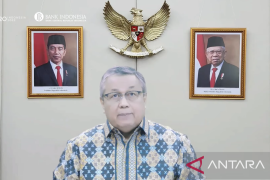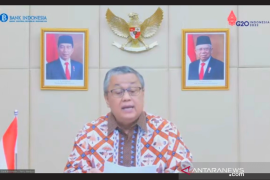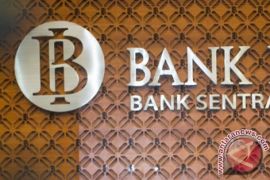The central bank`s step in cutting its benchmark interest rate by 50 basis point from 6.50 percent to 6 percent was expected to encourage banks to also lower their credits` interest rates.Jakarta (ANTARA News) - Bank Indonesia (BI/the central bank) has lowered its benchmark rate in an effort to encourage banks to cut their lending rates so that the development of the real sector could be boosted, a BI official said.
"BI lowered its rate recently hoping that banks would also follow suit so that the development of the real sector could be boosted," BI`s chief researcher for economic and monetary policy Perry Warjiyo said on Tuesday.
The central bank`s step in cutting its benchmark interest rate by 50 basis point from 6.50 percent to 6 percent was expected to encourage banks to also lower their credits` interest rates.
Perry said that the real sector badly needed the lowering of the banks` lending rates to increase their competitive edge as a result of the global economic slowing down.
Banks` role in the financing of the real sector was still relatively small as reflected in the ratio of credit provision against the country`s gross domestic product which was lower than those of other countries.
"Banks` low role in the financing sector is among other things caused by the high margin in the interest rates between deposit and landing which still reach six percent," he said.
Therefore, the decision to cut the key rate known as BI Rate was also part of the efforts to improve short-, medium- and, long-term interest structure, according to Bank Indonesia Governor Darmin Nasution.
The cut was also intended to ease the impact of worsening global economic prospects on the Indonesian economy, he said.
Perry earlier said that the world economy would grow steadily in 2012 regardless of global economic crisis.The same is also true to the Indonesian economic development next year.
"Bank Indonesia is of the view that the Indonesian economic growth will remain strong in 2012 although fears exist on adverse impacts of the world economic crisis," he said.
Indonesia`s economic growth in 2011 is expected to reach 6.5 percent with a growth of 6.6 percent in the fourth quarter.
In 2012, Indonesia`s economic growth is estimated at a range of between 6.3 percent and 6.7 percent.
In order to reinforce the country`s economic resilience and competitiveness amid the slump in world economic growth, Bank Indonesia is preparing six policy strategies.
"The first thing is that BI will optimize its monetary policy role in supporting national economic development," Perry Warjiyo said.
In anticipation of the impact of the global economic slowdown, BI will maintain its current monetary policy to encourage the lowering of landing rates.
"We hope that the lowering of BI`s benchmark interest rate by 50 basis points to 6 percent recently will encourage banks to also lower their landing and deposit rates so as to stimulate economic activities," he said.
He said BI`s second step would be increasing banks` business efficiency, intermediary role, resilience and competitiveness in the face of free competition.
"The third policy is to increase the efficiency of the payment system," he said adding that it would be carried out in the form of National Payment Gateway for both domestic and international transactions.
BI would also build, as a fourth step, a crisis prevention mechanism in an effort to strengthen global crisis impact anticipation. "BI is now working out a management crisis protocol," he said.
The fifth policy is that BI will increase its role in supporting the empowerment of the real sector which will be followed by the sixth strategy namely improving the BI management system, he said.
According to Acting Head of the Finance Ministry`s Fiscal Policy Affairs, Bambang Brodjonegoro, the lowering of the Bank Indonesia rate will help boost economic growth. "We believe the BI rate cut will spur growth through increased consumption and real sector development,"he said.
He said Bank Indonesia had taken into account low inflationary pressure in the coming three months so that it had the courage to lower its rate from 6.50 percent to 6 percent.
"Bank Indonesia had taken into account the inflation level in the coming three months," Bambang said.
Bank Indonesia has predicted that inflation at the end of 2011 would be recorded at four percent, or at the lower limit of BI`s previous estimate at 4-6 percent.
"The inflation rate this year can be four percent while that in 2012 is estimated at 4.7 percent," Perry Warjiyo said.
The inflation is low because of the drop in the prices of world commodities and the smooth distribution of food supply.
This is reflected in the October inflation which experienced a 0.12 percent deflation where the year-on-year inflation was recorded at 4.46 percent.
He said that it was the low inflation rate prediction that became the basis of BI to lower its benchmark interest rate from 6.50 percent to 6.0 percent last week.(*)
Reporter: By Andi Abdussalam
Editor: Heru Purwanto
Copyright © ANTARA 2011











